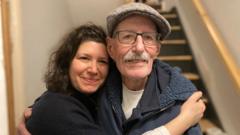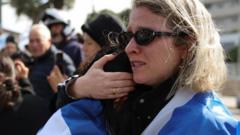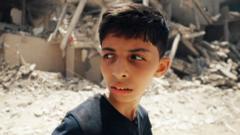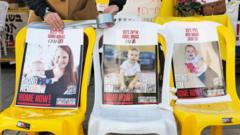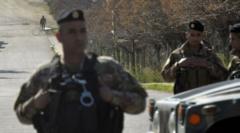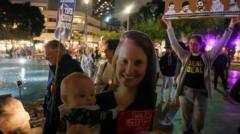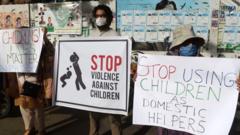The accounts reveal a grim picture of abuse, fear, and resilience among the female hostages released from Hamas, highlighting both the immediate effects of their ordeal and ongoing concerns for those still detained.
**Traumatized Return: Families of Released Hostages Share Harrowing Experiences Post-Hamas Capture**
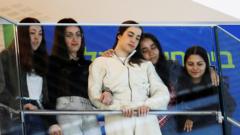
**Traumatized Return: Families of Released Hostages Share Harrowing Experiences Post-Hamas Capture**
Parents reflect on the physical and psychological torment endured by their daughters during their captivity in Gaza.
In a heart-wrenching reveal, parents of four Israeli women freed from Hamas captivity in Gaza have shared grim accounts of their daughters’ abuse, detailing starvation, intimidation, and forced labor during their 15 months in captivity. Orly Gilboa, mother of Daniella Gilboa, recounted how her daughter was only properly fed towards the end of their ordeal.
The families spoke exclusively to the BBC, shedding light on the conditions the women faced, which included being held in underground tunnels and coerced into participating in propaganda videos. The emotional toll was compounded by witnessing brutal violence against fellow hostages. As the parents shared their stories, they noted that their daughters found comfort in creativity, documenting their lives through drawing and journaling, although many details remain undisclosed due to fears for other hostages still in captivity.
Among the hostages were three female soldiers abducted from the Nahal Oz army base when Hamas launched an unprecedented attack on October 7, 2023, which resulted in the deaths of approximately 1,200 people and the abduction of over 250 individuals. The psychological impact of their experience was profound, with some hostages reporting significant weight loss and prolonged periods without sunlight.
Meirav Leshem Gonen recounted that her daughter Romi, who was kidnapped from the Nova music festival, returned after losing "20% of her body weight." Daniella's transition to her eventual release showed a mixed outcome; while she regained weight, she feared she might have resembled other emaciated hostages released earlier.
A shared sense of trauma characterized the parents' recollections, particularly when Orly Gilboa described a disturbing video of her daughter that suggested she had been killed, heightening the family’s distress during captivity. Attempts at communicating with the outside world brought some hope to the captives. At times, hostages were permitted to listen to a television or radio, providing brief glimpses of normalcy amid the chaos.
Yoni Levy, father of Naama Levy, shared that the moments surrounding the attack on their military base were profoundly traumatic for his daughter. In the aftermath, the families have called for inquiries into the circumstances of the abductions, and they have emphasized the importance of safeguarding the remaining hostages.
As the young women reintegrate into their lives in Israel, they find solace in small acts of defiance and resilience. Daniella has a tattoo of a butterfly inscribed with the word "freedom," symbolizing her survival and newfound hope. The path to healing remains ongoing, with families navigating the complexities of trauma, recovery, and the stark realities of prolonged conflict in the region.
The families spoke exclusively to the BBC, shedding light on the conditions the women faced, which included being held in underground tunnels and coerced into participating in propaganda videos. The emotional toll was compounded by witnessing brutal violence against fellow hostages. As the parents shared their stories, they noted that their daughters found comfort in creativity, documenting their lives through drawing and journaling, although many details remain undisclosed due to fears for other hostages still in captivity.
Among the hostages were three female soldiers abducted from the Nahal Oz army base when Hamas launched an unprecedented attack on October 7, 2023, which resulted in the deaths of approximately 1,200 people and the abduction of over 250 individuals. The psychological impact of their experience was profound, with some hostages reporting significant weight loss and prolonged periods without sunlight.
Meirav Leshem Gonen recounted that her daughter Romi, who was kidnapped from the Nova music festival, returned after losing "20% of her body weight." Daniella's transition to her eventual release showed a mixed outcome; while she regained weight, she feared she might have resembled other emaciated hostages released earlier.
A shared sense of trauma characterized the parents' recollections, particularly when Orly Gilboa described a disturbing video of her daughter that suggested she had been killed, heightening the family’s distress during captivity. Attempts at communicating with the outside world brought some hope to the captives. At times, hostages were permitted to listen to a television or radio, providing brief glimpses of normalcy amid the chaos.
Yoni Levy, father of Naama Levy, shared that the moments surrounding the attack on their military base were profoundly traumatic for his daughter. In the aftermath, the families have called for inquiries into the circumstances of the abductions, and they have emphasized the importance of safeguarding the remaining hostages.
As the young women reintegrate into their lives in Israel, they find solace in small acts of defiance and resilience. Daniella has a tattoo of a butterfly inscribed with the word "freedom," symbolizing her survival and newfound hope. The path to healing remains ongoing, with families navigating the complexities of trauma, recovery, and the stark realities of prolonged conflict in the region.

